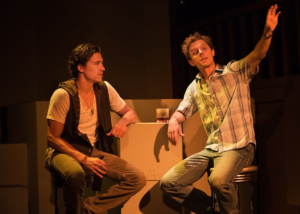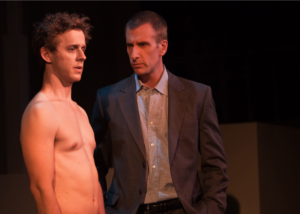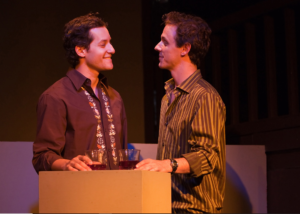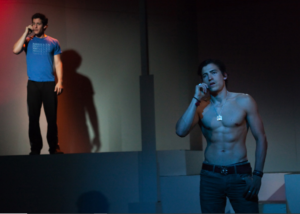
Freshly arrived in LaLa Land from Wyoming, aspiring actor Ted is working out on the treadmill at 24 Hour Fitness. Could the hunk doing cardio next to him possibly be gay? Perhaps a question or two might clear up any confusion. Ted: Do you like Madonna? Hunk: No. After a few more failed attempts to get the conversational ball rolling, the new guy in town plunges into his life story. “I never got that kind of radar thing you’re supposed to get,” the gaydar-challenged young actor explains. “You should try the Internet,” suggests the gym bunny, and when Ted plunges in and suggests maybe getting together, the studly object of his attention responds succinctly, “Sorry, but I don’t go out with guys I meet at the gym.”
Thus begins Erik Patterson’s He Asked For It, a play that starts out a hilarious spot-on commentary on the gay scene in today’s West Hollywood and ends up a devastating drama about a young man who goes looking for HIV and another young man only too happy to give it to him. That Patterson’s play manages to do this in a fresh, entertaining, gripping and entirely unpredictable way without ever preaching or oversimplifying or turning into a PSA is an amazing feat indeed.
A synopsis of some of He Asked For It’s early scenes should hint at what’s in store for audiences (without revealing too much) and hopefully provide incentive to see this superb production. Here goes:
 It’s a few days later and Ted (Joe Egender) is on his first Internet date, so naturally he’s nervous. “I read your profile ten times,” he gushes to Rigby (Andrew Keegan), the darkly handsome man he’s met on the Net. “I’m not an exaggerator,” he reassures his date, who wonders if Ted is obsessive, or merely thorough. Should he be flattered or frightened by Ted’s eager interest in him? Finally it hits Rigby. “You’re not from L.A., are you?” “No,” replies Ted, who explains to an incredulous Rigby that he moved to Los Angeles to “find someone who was real.” Who the hell is this sweet, ingenuous, sincere, adorable, romantic idealist in front of him?
It’s a few days later and Ted (Joe Egender) is on his first Internet date, so naturally he’s nervous. “I read your profile ten times,” he gushes to Rigby (Andrew Keegan), the darkly handsome man he’s met on the Net. “I’m not an exaggerator,” he reassures his date, who wonders if Ted is obsessive, or merely thorough. Should he be flattered or frightened by Ted’s eager interest in him? Finally it hits Rigby. “You’re not from L.A., are you?” “No,” replies Ted, who explains to an incredulous Rigby that he moved to Los Angeles to “find someone who was real.” Who the hell is this sweet, ingenuous, sincere, adorable, romantic idealist in front of him?
Whoever Ted is, Rigby feels he must be upfront with him. “I like skydiving,” he confesses. “I’m HIV positive and I don’t believe in parachutes. You do understand what I mean about not believing in parachutes. If you want a really complete connection, then let’s jump out of a plane together.” Ted may be naïve, but he’s not so naïve as to misunderstand what Rigby is suggesting, so he beats a retreat, though this will not be Ted and Rigby’s last meeting.
 Perhaps as a result of this disturbing date, Ted determines to focus on his career, and that means finding an agent. Cut to the office of Hollywood hotshot Marcus (Brian Unger), who tells him, “You’re going to drive the girls wild. You’ve got great abs. Show me.” Ted pulls up his shirt to reveal a nice six-pack. “So, are you going to sign me?” he asks Marcus guilelessly. “Could be,” responds slick Mr. Hollywood Agent, “but I need to ask you a question. I have to ask. Are you gay? No, don’t tell me. But are you?” Say WHAT? “If you want me to make you a movie star,” explains Marcus, “you can’t be a gay.” So when Marcus once again asks the question, Ted’s answer is an immediate and emphatic “No!” “Then I would love to represent you!” says Marcus, and Ted has got himself an agent.
Perhaps as a result of this disturbing date, Ted determines to focus on his career, and that means finding an agent. Cut to the office of Hollywood hotshot Marcus (Brian Unger), who tells him, “You’re going to drive the girls wild. You’ve got great abs. Show me.” Ted pulls up his shirt to reveal a nice six-pack. “So, are you going to sign me?” he asks Marcus guilelessly. “Could be,” responds slick Mr. Hollywood Agent, “but I need to ask you a question. I have to ask. Are you gay? No, don’t tell me. But are you?” Say WHAT? “If you want me to make you a movie star,” explains Marcus, “you can’t be a gay.” So when Marcus once again asks the question, Ted’s answer is an immediate and emphatic “No!” “Then I would love to represent you!” says Marcus, and Ted has got himself an agent.
Meanwhile, back in Wyoming, Ted’s 16-year-old sister Sophie (Sarah Foret) is dealing with the repercussions of her older brother’s departure from home. She phones Ted to give him a family update. Mom is in remission. She’s off of chemo. So why isn’t Ted happy about this news? “I’d kind of hoped that the cancer would make her want to reach out to me,” explains her brother, “and now that’s not going to happen.” As for his dad, the old man is no more interested in having anything to do with Ted than his mother is.
Back to another stab at Internet dating, Ted begins chatting with Henry, whose initially explicit IMs are not what Ted was expecting in the Romance Room. “I can do romance,” Henry tells him. Maybe his accidental stumbling into this room was for a reason. As Ted begins to get into chatting with Henry, who should pop up on his screen but Rigby? “You’re a freak,” types Ted. “I don’t want to talk to you.” Blocking the HIV positive guy, Ted makes a date with Henry.
Talk about hitting it off from the get-go A first date couldn’t be any more romantic than this one. Henry expresses a “highly inappropriate desire” to kiss Ted, which he does, and even though Ted isn’t usually comfortable with PDAs, Henry’s kiss couldn’t be sweeter or more romantic. The two men go on to exchange “weirdnesses,” and one they share is that it’s not heights they’re afraid of, it’s the awareness that they could jump if they wanted to.
Ted and Henry begin dating, and everything is perfect until …
There’s so much more that I could reveal, that I wish I could reveal, because He Asked For It is a play that I would really love to talk about, in specific terms, but this is one play whose many twists and turns should perhaps not even be hinted at. Best to talk about the amazing cast the Macha has assembled here.
Egender’s performance dazzles on so many levels that it’s easy to see why he got nominated for all three major L.A. theater awards (the Ovation, the LA Weekly, and the L.A. Drama Critics’ Circle), a trifecta that that almost never happens. Egender’s Ted is (in alphabetical order) adorable, angry, betrayed, despondent, disillusioned, eager, naïve, romantic, and sweet as can be. The actor is so engaging in the role that even though he may not have the drop-dead gorgeous looks that Patterson’s script appears to assign Ted, we absolutely believe that this is someone every gay man in his university drama group put first on their list as the one they’d most like to fuck, something which bodes well for Egender’s future in stage, screen, or television.
Opposite Egender is film/TV favorite Keegan, in a performance that belies the fact that this is his stage debut. Keegan’s movie star looks (like his musculature) have hardened, sharpened since his memorable role as the “newbie” in The Broken Hearts Club. So have his talents as an actor. That Keegan’s Rigby manages over the course of the play to change from someone despicable to someone the audience can care about and even sympathize with is a tribute to his acting gifts—and of course Patterson’s writing.
 As for Glazer’s Henry, faithful followers of StageSceneLA have read about the handsome young actor’s winning comedic performances in Anything and Seven Redneck Cheerleaders. Here Glazer gets the meaty lead role that he so richly deserves and delivers a performance that goes right to the heart. His work here is real, understated, honest, endearing, and deeply touching.
As for Glazer’s Henry, faithful followers of StageSceneLA have read about the handsome young actor’s winning comedic performances in Anything and Seven Redneck Cheerleaders. Here Glazer gets the meaty lead role that he so richly deserves and delivers a performance that goes right to the heart. His work here is real, understated, honest, endearing, and deeply touching.
Foret is absolutely wonderful as Sophie, coincidentally the name of the teenage character she played so charmingly in the ABC Family series Beautiful People. Entirely believable as a 16-year-old trying to use the F-word as often as possible as proof that she’s not a little girl anymore, or the teen caught between parental loyalty and the love she feels for her brother, or ultimately as a tough young woman looking for answers to some pretty difficult questions, Foret scores a home run in the role.
As Hollywood agent Marcus, Unger is a trip and a half. No, make that a trip and three-quarters. Then again, Hollywood is probably full of Marcuses, men who’ve thoroughly convinced themselves that they are 100% heterosexual males with an occasional, meaningless taste for dick, though in Marcus’s case, how occasional that might be is open to question. Unger deadpans to perfection, and there’s hardly a Marcus line that doesn’t get a laugh.
Kyle Jordan makes a strong impression in a single scene as Steve, a twink whose love for partying (i.e. getting high on crystal meth) proves disastrous. (Steve also utters one of the most profound albeit politically incorrect statements about HIV I’ve heard.) Superbuff Carter MacIntyre appears several times to fine comedic effect as Neal, the ditzy gym bunny.
 Director Neil H. Weiss’s staging makes ingenious use of Jeff McLaughlin’s multi-leveled set, effectively lit by McLaughlin, with some sensational animated projections (by Thomas Ontiveros) which situate the play firmly in Los Angeles and West Hollywood. Cricket Myers’ sound design is equally great, a combination of the sounds of L.A. and the sounds of WeHo nightlife with original music by John Ballinger. Jamie Herbert designed some character-perfect costumes, and though there is no nudity in He Asked For It, there is shirtlessness galore, physiques to make it highly enjoyable, and costume changes which take place onstage, with the help of a pair of stage hands slash dressers. (Playwright Patterson stepped into this role on the night of this performance).
Director Neil H. Weiss’s staging makes ingenious use of Jeff McLaughlin’s multi-leveled set, effectively lit by McLaughlin, with some sensational animated projections (by Thomas Ontiveros) which situate the play firmly in Los Angeles and West Hollywood. Cricket Myers’ sound design is equally great, a combination of the sounds of L.A. and the sounds of WeHo nightlife with original music by John Ballinger. Jamie Herbert designed some character-perfect costumes, and though there is no nudity in He Asked For It, there is shirtlessness galore, physiques to make it highly enjoyable, and costume changes which take place onstage, with the help of a pair of stage hands slash dressers. (Playwright Patterson stepped into this role on the night of this performance).
Ultimately, in the immortal words of someone much smarter than I, the play is indeed the thing, and the success of He Asked For It as a theatrical work comes from Patterson’s words. His dialog is clever and original, and the laughs, of which there are many, come from a place of truth. He Asked For It never becomes a message play, nor is it a sensationalist look at “bug chasers,” but by the final, devastating fadeout, much has been learned. It’s not an exaggeration to say that every gay man under the age of say thirty should see this play, and the younger the better. (Not that audiences should be limited by age or gender or sexual orientation.)
Featuring great writing, excellent direction, and a sensational design, He Asked For It is a wow of an evening of theater, one whose darker sides are balanced with enough laughs to make it that oxymoron, a play which both entertains and shatters. Exiting, daring, provocative, sexy, challenging, and thoroughly enthralling, He Asked For It is an absolute must-see
Macha Theater, 1107 N. Kings Road, West Hollywood.
www.heaskedforit.com
–Steven Stanley
June 21, 2009


 Since 2007, Steven Stanley's StageSceneLA.com has spotlighted the best in Southern California theater via reviews, interviews, and its annual StageSceneLA Scenies.
Since 2007, Steven Stanley's StageSceneLA.com has spotlighted the best in Southern California theater via reviews, interviews, and its annual StageSceneLA Scenies.







 COPYRIGHT 2024 STEVEN STANLEY :: DESIGN BY
COPYRIGHT 2024 STEVEN STANLEY :: DESIGN BY